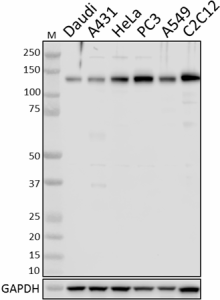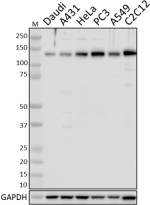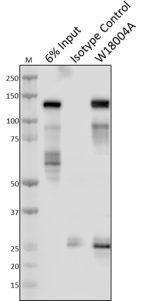- Clone
- W18004A (See other available formats)
- Regulatory Status
- RUO
- Other Names
- Serine/threonine-protein kinase ULK1, Autophagy-related protein 1 homolog, Unc-51-like kinase 1
- Isotype
- Rat IgG2a, κ
- Ave. Rating
- Submit a Review
- Product Citations
- publications

-

Total cell lysates (15 µg total protein) from the indicated cell lines were resolved by 4-12% Bis-Tris gel electrophoresis, transferred to a PVDF membrane, and probed with 1.0 μg/mL (1:500 dilution) of purified anti-ATG1 (ULK1) antibody, clone W18004A, overnight at 4°C. Proteins were visualized by chemiluminescence detection using HRP Goat anti-rat IgG antibody (Cat. No. 405405) at a 1:3000 dilution. Direct-Blot™ HRP anti-GAPDH Antibody (Cat. No. 607904) was used as a loading control at a 1:50000 dilution (lower). Lane M: Molecular Weight marker. -

Whole cell extracts (250 µg total protein) prepared from HeLa cells were immunoprecipitated overnight with 2 µg of purified rat IgG2a, κ isotype control antibody (Cat. No. 400502) or purified anti-ATG1 (ULK1) antibody, clone W18004A. The resulting IP fractions and whole cell extract input (6%) were resolved by 4-12% Bis-Tris gel electrophoresis, transferred to a PVDF membrane and probed with a rabbit control antibody against a separate epitope of ATG1. Lane M: Molecular weight marker.
| Cat # | Size | Price | Save |
|---|---|---|---|
| 622901 | 25 µg | ¥22,220 | |
| 622902 | 100 µg | ¥55,660 |
ATG1/ULK1 is a Serine/Threonine protein kinase which forms a complex with the Atg13 and FIP200 proteins. This complex is the most upstream component of the core autophagy machinery, and is therefore the key initiator of autophagy in mammalian cells. AMPK positively regulates autophagy under nutrient starvation and cellular stresses by phosphorylating ULK1, leading to the activation of the autophagic process and inhibition of mTOR. mTOR plays a negative role in this process when under growth factor- and nutrient-replete conditions, as it phosphorylates ULK1 and disrupts the interaction between ULK1 and AMPK. Autophagy is a mechanism used by tumors to survive energy deprivation and chemotherapy mediated stress. Autophagy is also implicated in autoimmune (Crohn's disease) and neurodegenerative diseases. Because of its role in autophagy ULK1 is considered an attractive drug target for such diseases.
Product DetailsProduct Details
- Verified Reactivity
- Human, Mouse
- Antibody Type
- Monoclonal
- Host Species
- Rat
- Immunogen
- Human ATG1 synthetic peptide conjugated to KLH (1-16 a.a.)
- Formulation
- Phosphate-buffered solution, pH 7.2, containing 0.09% sodium azide.
- Preparation
- The antibody was purified by affinity chromatography.
- Concentration
- 0.5 mg/ml
- Storage & Handling
- The antibody solution should be stored undiluted between 2°C and 8°C.
- Application
-
WB - Quality tested
IP - Verified - Recommended Usage
-
Each lot of this antibody is quality control tested by Western blotting. For Western blotting, the suggested use of this reagent is 1.0 µg per ml. For immunoprecipitation, the suggested use of this reagent is 2.0 µg per ml. It is recommended that the reagent be titrated for optimal performance for each application.
- Application Notes
-
At higher antibody concentrations, this clone may produce minor non-specific bands between 150 and 250 kD.
This clone was not tested for ICC.
- RRID
-
AB_2814476 (BioLegend Cat. No. 622901)
AB_2814476 (BioLegend Cat. No. 622902)
Antigen Details
- Structure
- ATG1/ULK1 is a 1050 amino acid protein with a predicted molecular weight of 112 kD.
- Distribution
-
Cytosolic
- Function
- Serine/Threonine Kinase/Autophagy regulator
- Biology Area
- Cell Biology, Signal Transduction
- Molecular Family
- Protein Kinases/Phosphatase
- Antigen References
-
- Kim J, et al. 2011. Nat. Cell. Biol. 10.1038/ncb2152.
- Hokosawa N, et al. 2009. Mol. Biol. Cell. 20:7.
- Egan D, et al. 2011. Autophagy. 7:643-4.
- Gene ID
- 8408 View all products for this Gene ID
- UniProt
- View information about ATG1 on UniProt.org
Other Formats
View All ATG1 Reagents Request Custom Conjugation| Description | Clone | Applications |
|---|---|---|
| Purified anti-ATG1 (ULK1) | W18004A | WB,IP |
Compare Data Across All Formats
This data display is provided for general comparisons between formats.
Your actual data may vary due to variations in samples, target cells, instruments and their settings, staining conditions, and other factors.
If you need assistance with selecting the best format contact our expert technical support team.









Follow Us